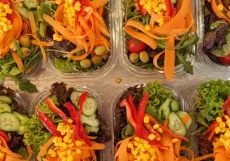Feeding Baby: Making Baby Food
0 Views

Making baby food is something more parents are interested in doing, especially with the controversies surrounding many of the commercial producers or baby food. Feeding baby is one of the most important ways to encourage healthy living and improve health when it is done with the proper nutrients. Before you begin feeding your baby any type of homemade food, be sure to consult with your baby’s doctor. Allergies and impurities can endanger some children.
Why Bother Making Baby Food?
There are many reasons to make your own baby food. First, you get to save money. Purchasing food you already eat and converting a small amount of it into baby food can cut down on your budget. Jars of baby food start at 50 cents or more and go up to several dollars a jar. Using several per meal can really add up considering the small amount of food your child is getting for your investment. Making your own baby food can cut out this expense altogether especially when you do not buy additional foods but rather use those foods you are already making.
Another reason to feed baby with homemade baby food is because you are in charge of the ingredients. Flip over any jar of baby food and you will find a list of ingredients. Unless the food is all natural and organically made (which it will say if it is) then you could be giving your baby foods that are full of pesticides and herbicides not to mention preservatives. Although many commercial producers of baby food are now offering a range of products that are organic, making your own food may help you feel more assured about the quality of the ingredients used.
What You’ll Need
To feed baby all natural foods from your kitchen, start with the right equipment. You will need to puree the food finely to insure that the child does not choke on it. You can use a blender or a food processer, but do strain it after producing it to insure that all of the clumps have been removed. Additionally, you will need to store the baby food in some type of sterilized container. A good option is an ice cube tray. This is an easy way to portion out the baby food, too. Store it covered tightly in the refrigerator or freezer if making more than you need for one meal.
Foods To Produce
Before you consider making baby food, take stock of what types of food you can use and how to choose the best products for baby. When you visit the grocery store, choose all organic produce to include in your baby’s diet. In most cases, making baby food will be a daily (or every other day) process, so only purchase what you can use during that period. All produce should be fresh and free from any damage.
Good foods to consider include:
• Bananas
• Apricots
• Apples
• Avocados
• Carrots
• Potatoes
• Prunes
• Pears
• Peaches
• Asparagus
• Sweet potatoes
• Squash
• Mangoes
Over time, you will be able to add other foods, but most doctors recommend just using fruits and vegetables during the first few months. You also do not want to use foods your child could potentially be allergic to.
Making Baby Food
Cleanliness is one of the biggest parts of producing baby food. You should insure everything, including your hands, has thorough sanitizing before getting starts. For fruits and vegetables, remove hard the hard peals and pits. Then, cook them enough to allow them to be easily pureed. It is best to boil or steam the products so that as much of the nutrients as possible remains within it. You can add breast milk or formula to help the puree process. Store the food in airtight containers.
Baby food should be nutrient rich to give the child as much of an opportunity to get nutrients into their system as possible. Never serve a baby foods that are hot, only lukewarm. Be sure to try only one new food at a time, too, allowing consumption of one food for a couple of days to insure the child is not allergic to it and is accepting of it.
Related Posts









